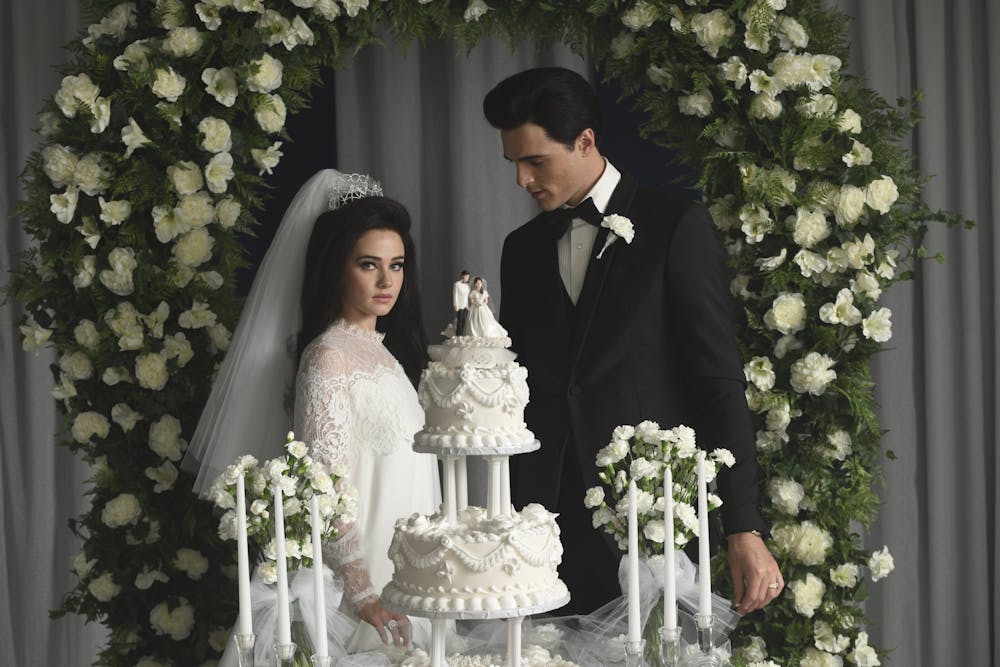Entering the theater to watch a Sofia Coppola film is a religious experience.
As one of my favorite directors, I felt a little jittery about this particular film. “Priscilla” is shrouded by such intrigue and controversy due to disapproval by Elvis and Priscilla Presley’s daughter, the late Lisa Marie Presley. Going in, I wasn’t sure how to feel given this sensitive information, but after a watch, I remembered why I fell in love with Coppola in the first place.
I have been obsessed with Coppola’s filmography since my first viewing of “The Virgin Suicides.” The 2000 film not only introduced me to the glorious musical stylings of Heart and Todd Rundgren but also delved into the depths of adolescent yearning. I absorbed the close up of Kirsten Dunst lying on a grassy football field, donning a white gown at dawn. I experienced the limited lens in which the sisters were seen through the gaze of their young male admirers. I felt as though Coppola told the stories of real teenage girls, amidst a sea of eyes that didn’t understand them. In an industry filled with male directors and films not passing the Bechdel test, Coppola stood out.
Through her work, I entrusted her to provide a true representation of Priscilla Presley, a figure which I only had encountered through Lana Del Rey’s homages and lace-covered images on my Pinterest board. Priscilla herself is also a figure which we have only seen through her attachment to Elvis.
Priscilla Presley, with minimal lines in Baz Luhrmann’s rhinestone-studded film “Elvis,” assumes center stage in “Priscilla.” Moved from her hometown of Austin, Texas, Priscilla and her family relocate to Germany due to her father’s military service. The audience is immersed in an almost nightmarish scenario, draped in a hauntingly beautiful dreamscape. The story begins in a diner in Germany, where Priscilla, portrayed by Cailee Spaeny, is questioned about whether she likes Elvis Presley. The answer seems self-evident, as all teenage girls seemed to be devoted fans in 1959.
Spaeny’s portrayal of the 14-year-old Priscilla is calm and polite, with a touch of naivety. Her meeting with Elvis, portrayed by Jacob Elordi, who towers over her the entire film, is magnetic. She is captivated by his charm, his iconic voice and his golden presence. He is drawn to the fact she reminds him of home, providing him with a sense of security during his military service in Germany. It would be a perfect love story – if only he weren’t 24.
Upon his return to America, he urges Priscilla to stay exactly as she is via phone call, a moment that sent shudders down my spine. His star power casts an unyielding influence over her. As the year passes and he calls her once more, Priscilla convinces her parents to let her stay with Elvis in Graceland. A situation that would be anyone’s dream leaves her alone, pining for Presley’s return from Hollywood shoots, waiting for him in his Tennessee mansion.
In America, Elvis and his friends and family are the only people she knows. Schoolgirls at the Catholic school that Elvis’s father, Vernon, drives her to every day, gossip about her involvement with the heartthrob. Elvis is her entire existence.
Loneliness is vividly depicted in montages of Priscilla’s youth almost wasting away through crowded, loud parties downstairs while she is upstairs completing her math homework. She finds solace in the company of the women working for Elvis, only to be separated from them by Vernon as the women have work to do, leaving her alone once again. Her high school graduation gift, a bright red 1963 Chevrolet Corvair, in which we never see her drive, symbolizes his control, and is a poignant reminder of her constrained existence.
Coppola’s direction is impeccable, offering fairytale-esque sequences that unveil a darker underbelly. She effortlessly captures the essence of a girl navigating a grand world all by herself. Priscilla’s life mirrors the aspirations of countless teenagers, yet what seems heavenly is depicted as hellish, almost as if Graceland were her personal prison.
As the film unfolds, their life together unravels, largely stemming from Elvis’s inability to see Priscilla as an individual with her own desires. She cries when her pregnancy is revealed to her, as she does not feel ready. While Elordi’s reading of “I’m gonna be a daddy?” elicited a giggle due to its distinctly over the top Southern accent, the scene was laced with a melancholy haze.
“Priscilla” is a powerful portrayal of stepping into one’s personhood. It is a portrait of a woman trapped in the grip of a superstar and her journey to freedom. It was delicate yet fierce, emanating an image of performed feminine perfection. From putting on false lashes before giving birth to never wearing a pattern as Elvis believed it didn’t flatter her shape, her style is underscored by his control. When she breaks free, she sheds the elaborate trappings for simpler attire and makeup. Priscilla’s path to self-love, to finding her identity after losing her childhood, is the soul of the film.
Although I did consume this film whilst sitting next to my lovely boyfriend (who did make sure to shake his head in disapproval of Elvis’s manipulative lines), it served as a stark reminder that men can be terrible, irrespective of their fame. With Elvis, it seemed as though he wanted to exert control over others, possibly due to his limited control with his own life. Priscilla was like a doll to him – someone he could dress up and play with, but tuck away until she became useful.
This film is heartache, and it is love. Elvis was Priscilla’s world for those years, and you can’t help but feel he is still with her to this day.






